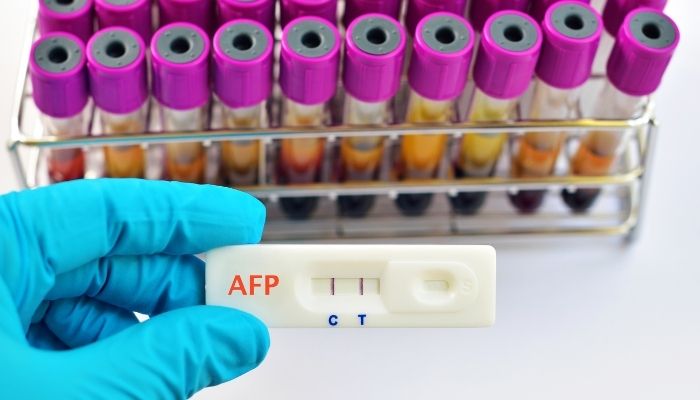An AFP tumor marker test is a type of blood test that estimates the levels of AFP (alpha-fetoprotein) in adults. Tumor markers are elements that are produced by cancer cells or by healthy cells in response to cancer in the body. High levels of AFP may indicate a sign of liver cancer or ovarian cancer or testicles cancer. Sometimes, a high level of AFP may indicate some noncancerous liver diseases like hepatitis and cirrhosis.

High AFP levels don’t imply you are having cancer and similarly, the normal levels don't always exclude cancer. So, an AFP test is not solely used to screen or diagnose cancer. But this alpha fetoprotein tumor marker test is useful in the detection of cancer along with other tests. Sometimes, your doctor may suggest this test to monitor the effectiveness of your cancer treatment or he can see if your cancer has returned after the completion of the treatment. The cost of the AFP tumor test is Rs.700 to Rs.1000, depending on your location and place.
Please check the price of the AFP tumor test in Delhi/NCR, your nearby centers and other details.
Test Summary
| Also known as | total AFP, alpha-fetoprotein-L3 Percent |
| Test Type | Blood |
| AFP tumor test includes | To check whether you have cancer including liver, ovary and testicles |
| Preparation | You may not need any special preparations |
| Reporting | Within 24 hrs |
| Test price | The cost of the AFP tumor test is Rs.700 to Rs.1000, depending on your location and place. |
| Also included in | Health Insurance Plans |
| Related tests | Biopsy test, MRI, Imaging tests |
The Objective of this Test
This test is beneficial in the following ways.- Confirms or rules out a diagnosis of liver cancer or cancer of the ovaries or testicles
- Check the progress of your cancer treatment. AFP levels may be elevated if your cancer is thriving and get down if the treatment works perfectly.
- Monitors if cancer has returned after the completion of the treatment
- Monitor people who have cirrhosis or hepatitis.
Why is this test recommended?
Your doctor may recommend this AFP tumor marker test if he/she suspects you are suffering from liver cancer or cancer of the ovaries or testicles. Your healthcare provider will suggest this test either to confirm or rule out the results of other tests.This test is also useful if you are receiving the treatment for your cancer or you have completed your course of treatment. By performing this test, your doctor could check how the treatment is working or if your cancer has returned after treatment.
Sometimes, this test is recommended if you have noncancerous liver disease. Certain liver diseases may enhance your risk of getting liver cancer in future.
The Preparation of the Test
You may not need any special preparations for an AFP tumor marker test.The Test Procedure
Once you reach your nearby lab or a test center, a healthcare staff will take your blood sample from a vein in your arm. The person will insert a small needle to collect the sample. Once the sample is drawn, the blood will be deposited into a test tube or vial. You may experience a certain pain when the needle goes in or out. The entire procedure will be completed within 5-10 minutes.The Interpretation of the Results
If your results portray high levels of AFP, you may suffer from either liver cancer or cancer of the ovaries or testicles. Sometimes, high levels of AFP may indicate other cancers, including Hodgkin’s disease and lymphoma, or noncancerous liver disorders.If you are receiving cancer treatment, you may perform this test several times during your treatment. After repeating tests, your results may show:


